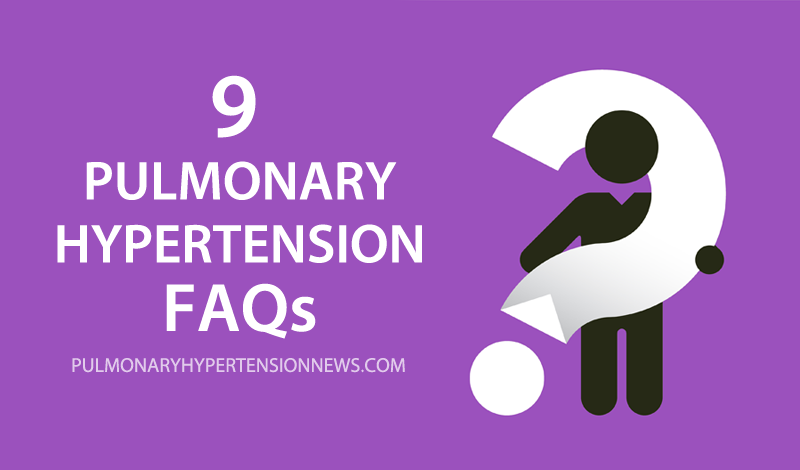9 Pulmonary Hypertension FAQs


Living with pulmonary hypertension can be quite difficult, especially if you’re a newly diagnosed patient. Since this is a rare condition, there are several questions that may come up which you feel the need to have answered. We’ve put together this list of nine of the most frequently asked questions concerning PH (source: Pulmonary Hypertension Association website):
1. What causes pulmonary hypertension? – Most of the time it’s impossible to identify the cause of PH and in these cases, we refer to it as idiopathic pulmonary arterial hypertension. If you suffer from other health conditions, such as scleroderma, HIV, liver disease (among others), pulmonary hypertension can also develop.
Read more about what causes pulmonary hypertension.

2. How does my doctor know I have PH? – Since this is a disease that can be extremely hard to diagnose in a routine medical exam, it’s not easy to have an accurate diagnosis. To help your physician diagnose you correctly, you will probably have to go through some specialized tests, such as a pulmonary function test and an echocardiogram, to determine if you have PH or not.
How is pulmonary hypertension diagnosed? Learn more about it here.

3. Could PH run in my family? – Although pulmonary hypertension could be heritable, the truth is that it’s relatively uncommon.
Learn more about familial or heritable pulmonary hypertension.

4. What types of doctors treat PH? – Patients are encouraged to see a cardiologist and pulmonologist to get the right treatment for PH.
Read more about 10 Questions to Ask Your Doctor About Pulmonary Hypertension

5. How can I find a doctor to treat my PH? – There are several ways to look for the best doctor to treat your PH. One way is to search for a physician through PHA’s Find a Doctor directory.
Read more about 10 Questions to Ask Your Doctor About Pulmonary Hypertension

6. What medications are available to treat PH? – Although there is still no known cure for pulmonary hypertension, there are a number of medications which are already available to treat it and help with the symptoms. These can be administered in several ways: directly into the vein, beneath the skin, orally, and by inhalation.
Wondering about pulmonary hypertension treatments? Here’s what you should know.

7. How will my doctor determine which treatment is best for me? – After you receive an accurate diagnosis of pulmonary hypertension, there are some things your physician will have to take into consideration, such as the severity of your illness and the results of your cardiac catheterization; only after those results will they be able to determine which treatment and/or medication will be right for you.
Wondering about pulmonary hypertension treatments? Here’s what you should know.

8. What’s the outlook for someone with PH? – Every PH patient is different and research is constantly evolving when it comes to discovering new treatment options and medications adequate for this condition. With that said, your journey with PH depends on many factors, including the severity of your disease and how you respond to treatment.

9. How will PH affect my life? – It’s obvious that your life is going to change dramatically after you’re diagnosed with pulmonary hypertension. Needless to say, you will have to make some lifestyle changes and alterations in order to improve your life and adapt to your new health condition.
Read more about 11 tips to self-manage pulmonary hypertension.
How is pulmonary hypertension diagnosed? Learn more about it here.
Pulmonary Hypertension News is strictly a news and information website about the disease. It does not provide medical advice, diagnosis or treatment. This content is not intended to be a substitute for professional medical advice, diagnosis, or treatment. Always seek the advice of your physician or another qualified health provider with any questions you may have regarding a medical condition. Never disregard professional medical advice or delay in seeking it because of something you have read on this website.







